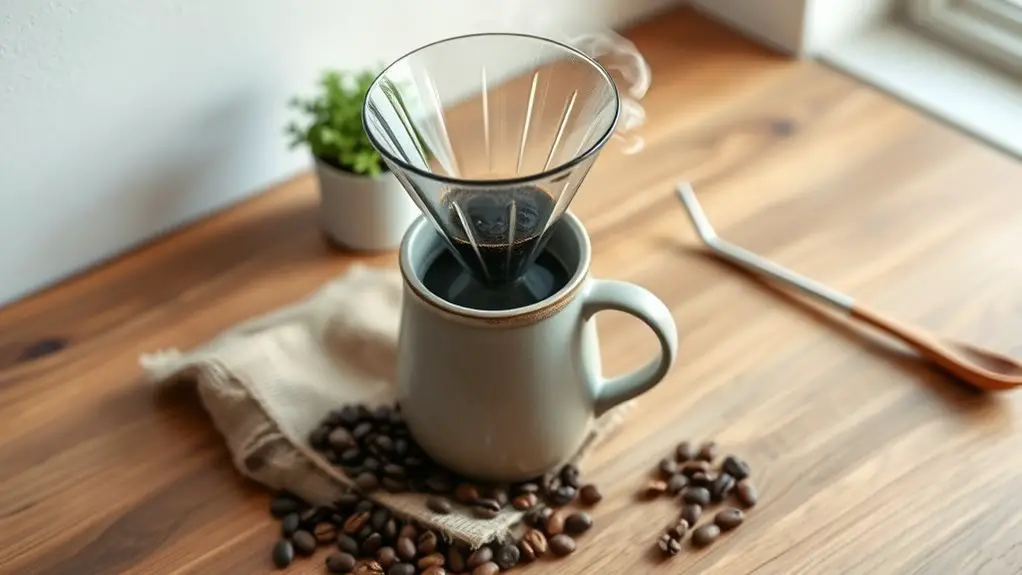To create a DIY zero-waste coffee setup, start by choosing a manual brew method like a French press or pour-over dripper. Use reusable coffee filters made of stainless steel, cloth, or silicone to cut down on waste. Opt for sustainable coffee beans that are fair trade and organic. Store your coffee in airtight containers to keep it fresh, and compost your used grounds to enrich your garden. Keep going to discover more eco-friendly tips!
Choose the Right Coffee Maker
When it comes to brewing your daily cup of joe, choosing the right coffee maker can make all the difference in your zero-waste journey. If you're looking for eco-friendly options, consider a manual brew method. Devices like pour-over drippers or French presses require no electricity and help you savor every step of the brewing process. They allow you to control the water temperature and extraction time, making it easier to enjoy a perfectly brewed cup while minimizing waste. Plus, you can skip the single-use pods and disposable machines entirely. Embracing these manual brewing techniques isn't just sustainable; it can also be incredibly liberating, letting you connect with your coffee in a more meaningful way. French press coffee, for instance, is known for its intense flavor and robust taste, which can enhance your coffee experience even further. Choose wisely, and enjoy every sip!
Opt for Reusable Coffee Filters
Switching to reusable coffee filters can greatly reduce waste in your coffee routine. Instead of tossing out paper filters after each brew, consider filter alternatives made from durable, reusable materials like stainless steel, cloth, or silicone. These options not only cut down on landfill contributions but can also enhance the flavor of your coffee by allowing essential oils and fine grounds to pass through. Plus, they're easy to clean—just rinse and reuse! Investing in a quality reusable filter can save you money in the long run, as you won't need to continuously buy disposable options. Additionally, using high-quality cheesecloth can provide an eco-friendly option that is washable and reusable. Embrace the freedom of a zero-waste coffee setup by making this simple switch and enjoy a more sustainable brewing experience!
Select Sustainable Coffee Beans
Choosing sustainable coffee beans is essential for reducing your environmental impact, as these beans are often sourced from farms that prioritize eco-friendly practices. Look for options labeled as fair trade, which guarantees that farmers receive fair wages and work in safe conditions. This not only supports their livelihoods but also promotes sustainable farming methods. Additionally, consider beans with organic sourcing, as they're grown without harmful pesticides or fertilizers, benefiting both the environment and your health. By selecting sustainable coffee, you're contributing to a system that values ethical practices and environmental stewardship. Organic coffee farming practices can also enhance biodiversity and soil health, making your coffee choice even more impactful. So, next time you shop for coffee, choose brands that align with your values, and savor every sip knowing you're making a positive difference.
Store Coffee Properly to Reduce Waste
After selecting sustainable coffee beans, the next step is to guarantee you store them properly to maintain their freshness and flavor while minimizing waste. Invest in airtight containers to protect your beans from air, moisture, and light, which can all degrade coffee freshness. Glass jars with rubber seals or ceramic containers work great. Keep your coffee in a cool, dark place, away from heat sources like stoves or direct sunlight. It's best to buy in small batches so you can enjoy your coffee at its peak flavor without risking spoilage. Remember, stale coffee not only tastes bad but also contributes to unnecessary waste. By following these simple steps, you'll savor every cup while embracing a zero-waste lifestyle. Additionally, using one-way gas valves in your storage solutions can help maintain the freshness of your coffee beans by allowing CO2 to escape while preventing oxygen from entering.
Embrace Composting for Coffee Grounds
While many people toss their used coffee grounds in the trash, embracing composting can turn this waste into a valuable resource for your garden. Composting benefits you by reducing landfill waste and enriching your soil. When you add coffee grounds to your compost pile, they provide nitrogen, which helps accelerate decomposition and fosters healthy plant growth. You can also use coffee grounds directly in your garden; sprinkle them around plants to deter pests or mix them into your soil for added nutrients. Plus, their acidity can benefit acid-loving plants like blueberries. By composting your coffee grounds, you're not just minimizing waste—you're empowering your garden to thrive. So, give those grounds a second life and watch your plants flourish!
Frequently Asked Questions
What Are the Benefits of a Zero-Waste Coffee Setup?
A zero-waste coffee setup offers you sustainable sourcing options and the joy of composting grounds. You reduce waste, support eco-friendly practices, and enjoy fresher coffee, all while embracing a lifestyle that values freedom and responsibility.
Can I Use Expired Coffee Beans?
Imagine opening a bag of expired coffee beans, expecting a rich aroma but finding a stale scent instead. While expired coffee isn't harmful, its flavor diminishes. For best results, always prioritize bean freshness tips!
How Do I Clean My Reusable Coffee Filters?
Cleaning your reusable filters is simple! You can soak them in hot water with vinegar or baking soda for effective cleaning. Rinse thoroughly, and they'll be ready for your next delicious brew—no waste, just great coffee!
What Are Alternatives to Traditional Coffee Makers?
If you're looking for alternatives to traditional coffee makers, consider pour over methods or a French press. Both offer rich flavors and allow you to control brewing time, giving you a personalized coffee experience.
How Can I Recycle Coffee Packaging Effectively?
To recycle coffee packaging effectively, compost coffee grounds to enrich your garden, and repurpose coffee bags for storage or crafts. You'll reduce waste while embracing creativity, making your coffee routine both eco-friendly and fun!
